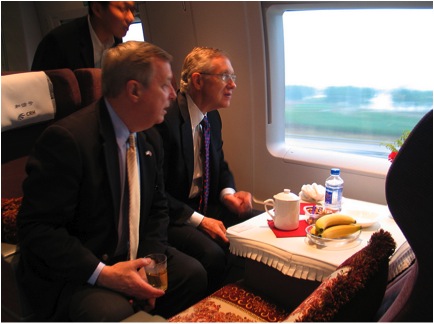President Obama had sought $8 billion for high-speed rail in 2012. The House-passed budget had exactly zero. The Senate bill approved by the Transportation subcommittee Tuesday followed suit. But the full Appropriations Committee yesterday put $100 million back into next year's budget for the president's signature transportation initiative.

That's still starvation wages for the program, but it's at least a placeholder that keeps it limping along. The move was spearheaded by four Democratic senators -- Dick Durbin of Illinois, Frank Lautenberg of New Jersey, Dianne Feinstein of California and Mary Landrieu of Louisiana -- who introduced the successful amendment to reallocate some funds earmarked for highway and transit projects to high-speed rail.
"I offered this amendment because we can’t turn our backs on a project that will invest in the future and put Californians back to work," Feinstein said in a statement.
"Every dollar we spend on rail produces $3 in economic output,” added Senator Durbin, a founding member of the Bi-Cameral High-Speed and Intercity Passenger Rail Caucus. "Congress has maintained a commitment to high speed and intercity rail for over a decade. This amendment will continue that commitment."
Highway funding in the Senate bill stays at FY2011 levels, but the chamber added another $358 million for the New Starts program for transit capital investments, previously funded at $8.3 billion. The House budget would reduce New Starts to $5.3 billion.
TIGER got a little bump too, with the Senate raising the allocation from $527 million to $550 million. Of that, $120 million is reserved for rural communities. The third round of TIGER grant applications is currently underway.
The Senate-passed budget keeps $90 million for the tri-agency Partnership for Sustainable Communities (down from $100 million in 2011), a victory for livability advocates and anyone who prefers federal collaboration and efficiency over stovepipes and silos.
The bill also includes $25 million for energy efficiency improvements for transit systems to reduce their greenhouse gas emissions. And the Washington metro system, always threatened with federal cuts, comes away with $150 million for capital investments, with a focus on safety.
These numbers are by no means final. They vary widely from the FY2012 budget the House passed two weeks ago. At some point, the two chambers will have to find a compromise between two significantly different funding proposals, but for now, they're just trying to figure out an extension (or "continuing resolution") of the current year's budget in order to keep government programs funded past September 30. Last night's vote in the House failed dramatically, with both Democrats and Tea Party Republican dissenting.
Both chambers are supposed to be on recess next week, but leadership might require members to stay in Washington, at least through the weekend, to hammer out a deal if they can't work one out by the end of the this week. Congress doesn't normally vote on Fridays, either, so many lawmakers are hoping for progress today so they can return to their districts.





